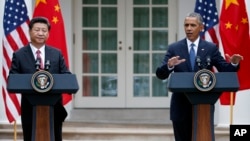During President Barack Obama and Xi Jinping’s joint press conference held in the Rose Garden as part of a state visit at the White House in Washington, DC on September 25, President Obama publicly asked China to directly engage with the Dalai Lama or his representatives to resolve Tibet’s issue.
This is significant as human rights situation inside Tibet and China under Xi’s rule has been deteriorating and many right groups have been urging Obama to publicly address human rights related issues during Xi’s visit to D.C.
It also comes at a time, when China has released two successive White Papers on Tibet praising its own polices inside Tibet and rejecting the Middle Way Approach to resolve Tibet's issue.
Tibetans from all over the United States have mounted a determined and noisy protest against Xi Jinping and his policies.
VOA Tibetan's Table Talk invites Bhuchung K. Tsering, Vice President of International Campaign for Tibet, and Tsepa Bayul, Communication Director of Student for a Free Tibet, to discuss the significance of Xi’s visit on Tibet.





